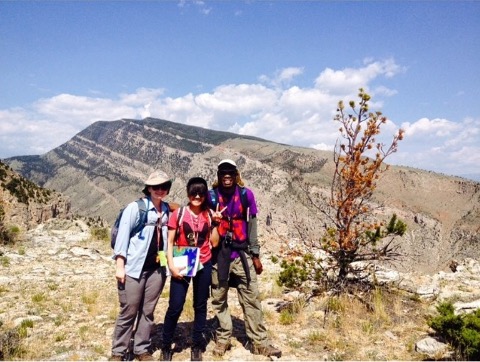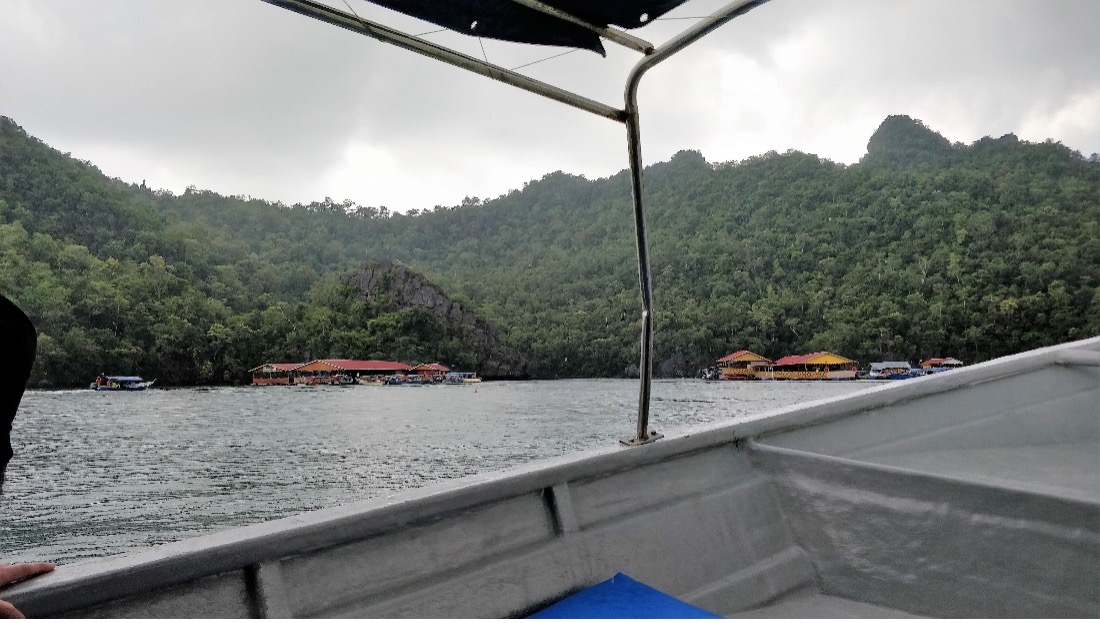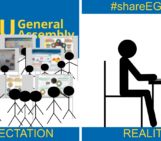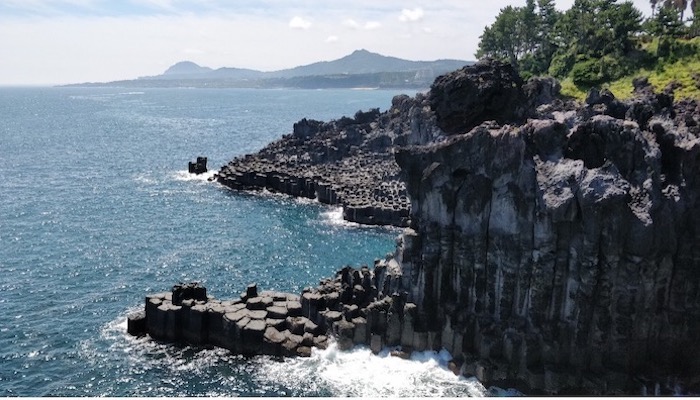
When most people hear Geology, they might think ‘rocks’, ‘diamonds’ or ‘oil and gas’, and these perceptions of the Geosciences vary from country to country. This week, we have PhD student Ayuni Ina Mohamaad from the University of Florida to tell us more about the Malaysian view of geoscientists.

Guest author PhD student Ayuni Ina Mohamaad is president of the Northern Florida Chapter of Association for Women Geoscientists. Follow them on Facebook, Instagram and Twitter!
Fresh out of high school in 2009, I was still unclear with how I would like to move forward in life, career-wise. I have a strong passion for animals and dreamed of becoming a veterinarian. Unfortunately, in my home country of Malaysia it was, at the time, not a career path that would ensure job security and income stability. I was in a limbo until I was introduced to the term ‘Geology’ at 18 years old with the tagline that geologists get paid very well, especially in the oil and gas industry.
However, that alone was not enough to help me decide if this is the right path for me. I did not know of any geologist personally to ask about the topic, considering I did not even know what Geology was! To get a better idea of what constitutes this well-paid-career, I did extensive research online to learn more about Geology, though what I found was barely just enough to convince me to ‘give it a try’. “Rocks can be pretty interesting I guess,” I thought as I tried to persuade myself. Little did I know that I would instantly fall in love with Geology and the Geosciences, developing a strong passion for the subject.
What I understood the most throughout my undergraduate study is that the Geosciences are so much more than just learning about the earth and understanding how it works. It is a world of non-stop exploration and discovery, and that is what thrills me the most. The different branches alone are fascinating and how each branch is intertwined with one another makes it even more compelling (and complicated of course!). It’s one of the reasons why I wanted to continue to graduate school after I received my bachelor’s degree. I remember when I sat down in my first ever Geology class during my undergraduate programme, and I was so amazed with how Geology is a mishmash, an application of other sciences: biology, chemistry, physics, astronomy, and mathematics. It is not just about looking at rocks out in the field (Earle, 2015).
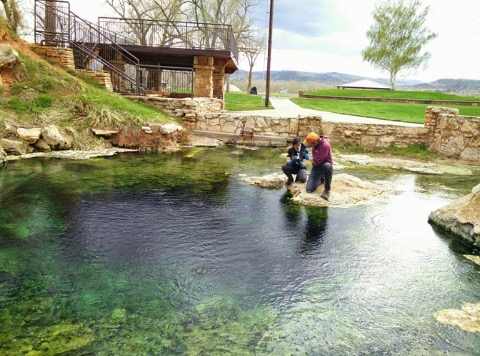
Figure 1: My supervisor, Dr. John Kaszuba and I collecting water samples in Thermopolis, Wyoming, during my undergraduate program.
Though, in Malaysia, when the term Geology comes to mind, ‘Geologi’ or ‘Kaji Bumi’ in our official language, Malay, the immediate connection is always to oil and gas. It is also quite common to even equate Geology to Geography…
Given that Malaysia’s national oil and gas company, Petroliam Nasional Berhad or better known as PETRONAS, is one of the leading oil companies in Southeast Asia and one of the world’s largest natural gas producers and exporter (U.S. Energy Information Administration, 2021), as well as the only Malaysian company listed in Fortune Global 500 ranked at 277 as of 2021 (highest rank is 68 in 2015) (Fortune, 2021), it makes sense that the general public in Malaysia tend to connect Geology with oil and gas. The oil and gas industry contributes a whopping 20% to Malaysia’s annual Gross Domestic Product (GDP) and has only become increasingly more important (Malaysian Investment Development Authority, 2021).
On top of that, generally primary and secondary school curriculums in Malaysia do not include Geoscience as a subject. While there are some Geology topics that overlap with Geography in the curriculum, it is not enough to inform students of what Geoscience is all about (Senin, 2019). It seems like there is barely any awareness of this subject at all for students in the public school system prior to entering college or university. Unlike in the United States, in which Geology and environmental science classes are offered as an elective for students in most schools, the curriculum in Malaysia does not provide the same opportunity in either public or private schools (Senin, 2019; Carrick et al., 2016).
As you can tell from my introduction earlier, I personally experienced the same thing too!
Even though the lucrative oil and gas industry may attract recently graduated high school students to learn more about Geoscience, most Malaysians have little to no exposure to Geoscience, and thus are unaware of what Geoscience is beyond the oil and gas industry.
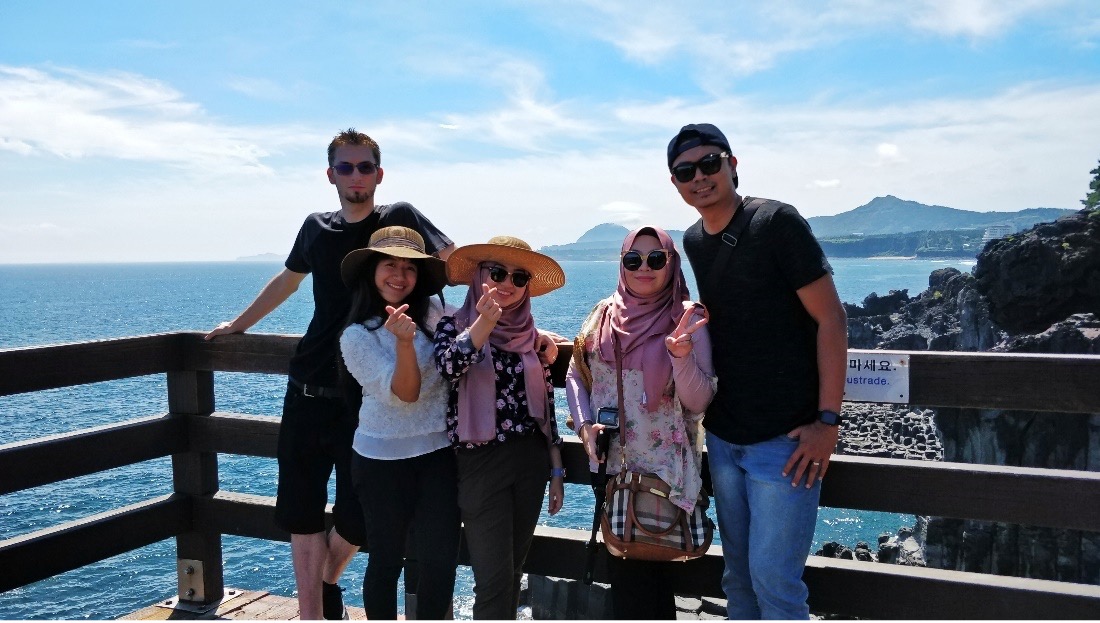
Figure 3: My several successful attempts (at least to me!) at getting my family to visit geological sites. (Top) Columnar basalts at Daepo Haean Jusangjeolli Cliff, South Korea, (middle and bottom) Mangrove Forest and Limestone Formations at Kilim Geoforest Park, Malaysia.
While I am currently focusing on my PhD programme at the University of Florida, another one of my goals is to continue to spark interests in my family, friends, and the public on how wonderful the world of Geosciences is and how it encompasses everything we do in life. Even more so now I believe it is important for the public to be well-informed, especially when it comes to the topics of climate change and its impact on our daily lives.
Climate change education is vital in addressing the concern (United Nations, 2021). However, it is difficult to bring awareness on climate change issues. Taking actions to combat climate change requires people to make a trade-off between short-term and long-term benefits, which is arguably the most difficult trade-off to make (Markman, 2018). Additionally, the threat of climate change is not as obvious or direct, which cause people to ignore the issue at hand (Markman, 2018). For example, the threat of a barking, aggressive dog is more obvious compared to the threat of rising sea level. Moreover, weather disasters because of climate change tend to be viewed as a distant issue (Markman, 2018). While a disastrous Australian wildfire may greatly affect the locals and motivate them to take actions against climate change, those who live far away would barely blink an eye on the impact.
The impact of climate change can be felt and seen in Malaysia too. The country has recently experienced one of the worst flooding events in modern history, which was exacerbated by climate change (Reuters, 2022). While flooding is generally expected to occur during the November to February monsoon season, the most recent torrential rain in the region occurred in late December 2021 and has displaced over 125,000 Malaysians spanning over seven states with a death toll of over 50 (Reuters, 2022). While there was a warning system in place, it was rendered ineffective due to a lack of urgency on the part of the federal and state agencies (Yusof, 2021). The Selangor State Secretariat issued a warning alert on November 17th, early enough for preparation. .The President of the Geological Society of Malaysia have urged the Malaysian government to establish a ‘Pusat Bencana Geologi’, an agency focused solely on mitigating natural disasters (Bakri, 2022). Considering the increasing threat of natural disasters is likely in the future, it is imperative for the government to listen to the experts in their field. The possibilities are endless!
Moving forward, one of my aims is to continue bringing people’s attention and garner their interest on climate change education. I also advocate for diversity in the Geoscience world, in particular, through my work as the president of the Northern Florida Chapter of Association for Women Geoscientists Our Chapter have held several events in the Department of Geological Sciences at the University of Florida to raise awareness regarding diversity issues in the Geoscience. In February 2022, we held a movie screening of the film “Hidden Figures” to celebrate International Day of Women and Girls in Science. By the end of the film, our attendees have had a fruitful, impromptu discussion on diversity issues within the university, as well as the overall Geoscience. We also recently held a combined event in March 2022 to celebrate Women’s History Month and Pi Day. Our goal was to bring awareness on amazing women who have been looked over, while at the same time appreciating the significance of Pi Day.
References
Azmi, H. (2022). Malaysia’s floods expose depth of its inability to handle climate change. South China Morning Post. Available at: https://www.scmp.com/week-asia/health-environment/article/3164287/malaysias-floods-expose-depth-governments-inability
Bakri, M.H.Y. (2022). Tubuh Pusat Bencana Geologi Kesan Bencana. Utusan Digital. Available at: https://www.utusan.com.my/berita/2022/03/tubuh-pusat-bencana-geologi-kesan-bencana/
Carrick, T., Miller, K., Hagedorn, E., Smith-Konter, B. and Velasco, A. (2016). Pathways to the Geosciences Summer High School Program: A Ten- Year Evaluation. Journal of Geoscience Education, [online] 64(1), p.1. Available at: https://files.eric.ed.gov/fulltext/EJ1091133.pdf
Earle, S. (2015). 1.1 What Is Geology? – Physical Geology. Opentextbc.ca. Available at: https://opentextbc.ca/geology/chapter/1-1-what-is-geology/
Fortune (2021). Petronas | 2020 Global 500. https://fortune.com. Available at: https://fortune.com/company/petronas/global500/
Malaysian Investment Development Authority (2021). Oil and Gas. MIDA | Malaysian Investment Development Authority. Available at: https://www.mida.gov.my/industries/services/oil-and-gas/#:~:text=It%20continues%20to%20be%20an
Markman, A. (2018). Why People Aren’t Motivated to Address Climate Change. Harvard Business Review. 11 Oct. Available at: https://hbr.org/2018/10/why-people-arent-motivated-to-address-climate-change
Reuters (2022). Malaysia floods hit seven states forcing thousands to evacuate. CNN. Available at: https://www.cnn.com/2022/01/02/asia/malaysia-floods-evacuation-intl-hnk/index.html
Senin, A. (2019). Surat Pekeliling Ikhtisas Kementerian Pendidikan Malaysia Bilangan 6 Tahun 2019. Available at: https://www.moe.gov.my/pekeliling/3054-spi-bil-6-tahun-2019-pelaksanaan-kssm-menengah-atas-dan-pakej-mata-pelajaran-tahun-2020/file
U.S. Energy Information Administration (2021). Country Analysis Executive Summary: Malaysia. U.S. Energy Information Administration, p.1. Available at: https://www.eia.gov/international/content/analysis/countries_long/Malaysia/malaysia.pdf
United Nations (2021). Education is Key to Addressing Climate Change. United Nations. Available at: https://www.un.org/en/climatechange/climate-solutions/education-key-addressing-climate-change
Yusof, A. (2021). Malaysia’s “once in 100 years” flood exposes reality of climate change, better disaster planning needed: Experts. Channel News Asia. Available at: https://www.channelnewsasia.com/asia/malaysia-once-100-years-flooding-climate-change-disaster-planning-2391316

